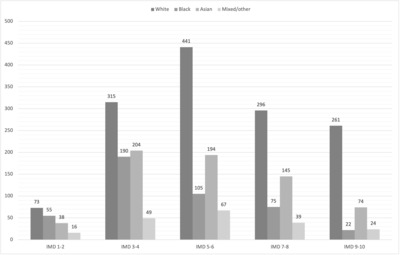Minopoli, M; Noël, L; Dagge, A; Blayney, G; Bhide, A; Thilaganathan, B
(2024)
Maternal ethnicity and socioeconomic deprivation: influence on adverse pregnancy outcomes.
Ultrasound Obstet Gynecol, 64 (2).
pp. 187-192.
ISSN 1469-0705
https://doi.org/10.1002/uog.27625
SGUL Authors: Bhide, Amarnath Thilaganathan, Baskaran
|
PDF
Published Version
Available under License Creative Commons Attribution. Download (279kB) | Preview |
|
![[img]](https://openaccess.sgul.ac.uk/116310/6.hassmallThumbnailVersion/uog27625-sup-0001-figures1.png)
|
Image (PNG) (Figure S1)
Supplemental Material
Download (189kB) | Preview |
|
![[img]](https://openaccess.sgul.ac.uk/116310/11.hassmallThumbnailVersion/uog27625-sup-0002-figures2.png)
|
Image (PNG) (Figure S2)
Supplemental Material
Download (215kB) | Preview |
|
|
Microsoft Word (.docx) (Tables S1-S3)
Supplemental Material
Download (15kB) |
||
|
PDF
Accepted Version
Available under License ["licenses_description_publisher" not defined]. Download (573kB) | Preview |
Abstract
OBJECTIVE: To evaluate the relative importance of ethnicity and socioeconomic deprivation in determining the likelihood and prevalence of placentally derived composite of adverse pregnancy outcomes (CAPO) and composite of severe adverse pregnancy outcomes (CAPO-S). METHODS: This was a single-center retrospective cohort study of data obtained in a tertiary maternity unit. Data regarding ethnicity and socioeconomic deprivation (as measured with indices of multiple deprivation) were collected for 13 165 singleton pregnancies screened routinely in the first trimester for pre-eclampsia using the Fetal Medicine Foundation combined risk-assessment algorithm. CAPO was defined as the presence of one or more interrelated outcomes associated with placental dysfunction, namely, hypertensive disorders of pregnancy, preterm birth, birth weight ≤ 10th centile and stillbirth. CAPO-S was defined as the presence of one or more of the following: hypertensive disorders of pregnancy at < 37 + 0 weeks, preterm birth at < 34 + 0 weeks, birth weight ≤ 5th centile and stillbirth at < 37 + 0 weeks. RESULTS: The prevalence of CAPO was 16.3% in white women, 29.3% in black women and 29.3% in South Asian women. However, half (51.7%) of all CAPO cases occurred in white women. There was a strong interaction between ethnicity and socioeconomic deprivation, with a correlation coefficient of -0.223. Both ethnicity and socioeconomic deprivation influenced the prevalence of CAPO and CAPO-S, with the contribution of ethnicity being the strongest. CONCLUSIONS: Black and Asian ethnicity, as well as socioeconomic deprivation, influence the prevalence of placenta-mediated adverse pregnancy outcomes. Despite this, most adverse pregnancy outcomes occur in white women, who represent the majority of the population and are also affected by socioeconomic deprivation. For these reasons, inclusion of socioeconomic deprivation should be considered in early pregnancy risk assessment for placenta-mediated CAPO. © 2024 The Authors. Ultrasound in Obstetrics & Gynecology published by John Wiley & Sons Ltd on behalf of International Society of Ultrasound in Obstetrics and Gynecology.
| Item Type: | Article | ||||||||
|---|---|---|---|---|---|---|---|---|---|
| Additional Information: | © 2024 The Authors. Ultrasound in Obstetrics & Gynecology published by John Wiley & Sons Ltd on behalf of International Society of Ultrasound in Obstetrics and Gynecology. This is an open access article under the terms of the Creative Commons Attribution License (http://creativecommons.org/licenses/by/4.0/), which permits use, distribution and reproduction in any medium, provided the original work is properly cited. | ||||||||
| Keywords: | composite adverse outcome of pregnancy, ethnicity, indices of multiple deprivation, preterm birth, pre‐eclampsia, small‐for‐gestational age, socioeconomic deprivation, stillbirth, uteroplacental dysfunction, composite adverse outcome of pregnancy, ethnicity, indices of multiple deprivation, pre-eclampsia, preterm birth, small-for-gestational age, socioeconomic deprivation, stillbirth, uteroplacental dysfunction, composite adverse outcomes of pregnancy, Ethnicity, indices of multiple deprivation, pre-eclampsia, preterm birth, small-for-gestational-age, socioeconomic deprivation, stillbirth, uteroplacental dysfunction, 1114 Paediatrics and Reproductive Medicine, Obstetrics & Reproductive Medicine | ||||||||
| SGUL Research Institute / Research Centre: | ?? 63 ?? | ||||||||
| Journal or Publication Title: | Ultrasound Obstet Gynecol | ||||||||
| ISSN: | 1469-0705 | ||||||||
| Language: | eng | ||||||||
| Publisher License: | Creative Commons: Attribution 4.0 | ||||||||
| PubMed ID: | 38419266 | ||||||||
| Web of Science ID: | WOS:001259332800001 | ||||||||
| Dates: |
|
||||||||
 |
Go to PubMed abstract | ||||||||
| URI: | https://openaccess.sgul.ac.uk/id/eprint/116310 | ||||||||
| Publisher's version: | https://doi.org/10.1002/uog.27625 |
Statistics
Actions (login required)
 |
Edit Item |



